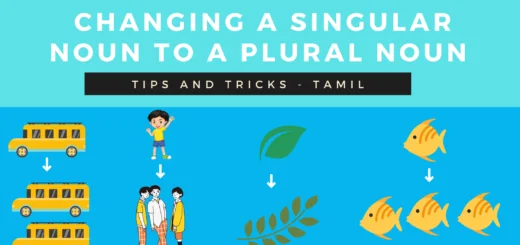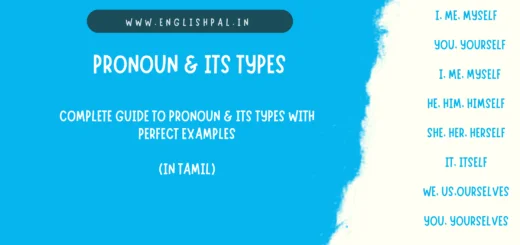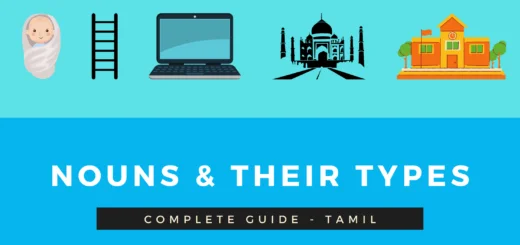Adverbs (வினை உரிச்சொற்கள்) with examples in Tamil
Adverbs என்பதன் தமிழ் பொருள் வினை உரிசொற்கள் என்பதாகும். ஒரு வினைசொல்லினை பற்றி விவரிக்க adverb உதவுகிறது. இது ஒரு செயலானது அல்லது வினையானது எவ்வாறு நடக்கிறது என்று குறிப்பிட உதவுகிறது.

-ly இல் முடியும் வினை உரிச்சொற்கள்
பெரும்பாலான adverbs -ly ஐக் கொண்டு முடிகிறது. இந்த வினை உரிச்சொல்லை நாம் வாக்கியத்தில் உபயோகிக்கும்போது அந்த வினைச்சொல்லினால் ஏற்படும் விளைவுகளை உணர்ச்சியுடன் கூற உதவுகிறது.
Examples
- They cried silently. – அவர்கள் மெளனமாக அழுதார்கள். அல்லது அவர்கள் சத்தமின்றி அழுதார்கள்.
- The baby is sleeping soundly. – குழந்தை நன்றாக தூங்குகிறது.
- Haran played beautifully. – கரன் அழகாக விளையாண்டான்.
- It is raining heavily. – கனமழை பெய்து வருகிறது.
- The singer is singing sweetly. – பாடகர் இனிமையாக பாடுகிறார்.
- The sun is shining brightly. – சூரியன் பிரகாசமாக பிரகாசிக்கிறது.
- The husband and wife live together peacefully. – கணவனும் மனைவியும் ஒன்றாக அமைதியாக வாழ்கின்றனர்.
- The young man walks quickly. – இளைய மனிதன் வேகமாக நடக்கிறான்.
- The Army soldiers fought bravely to protect their country. – ராணுவ வீர்கள் தங்கள் நாட்டை காப்பாற்ற வீரமாக போராடினர்.
Adjectives இன் இறுதியில் -ly ஐ சேர்த்து பெரும்பாலான adverbs உபயோகப்படுத்தப் படுகின்றன. அவற்றில் பொதுவாக நாம் நம் அன்றாட வாழ்வில் உபயோகிக்கும் வினை உரிச்சொற்களை அட்டவணையில் தந்துள்ளேன். அவற்றை படித்து தெரிந்து கொள்ளுங்கள்.
| Adjectives | Adverbs |
| brave | bravely |
| beautiful | beautifully |
| fierce | fiercely |
| happy | happily |
| loud | loudly |
| bright | brightly |
| slow | slowly |
| sound | soundly |
| sweet | sweetly |
| heavy | heavily |
| sudden | Suddenly |
| safe | safely |
| clear | clearly |
| Cheap | cheaply |
Adverbs of manner
Adverbs of manner என்பதன் தமிழ் பொருளானது செயல் நடைபெறும் வினை உரிச்சொல் என அழைக்கப்படுகிறது. சில வினை உரிசொற்கள், ஒரு வினையானது அல்லது செயலானது எவ்வாறு நடைபெற்றது என்பதைக் குறிப்பிட உதவுகிறது. இத்தகைய வினை உரிசொற்கள் adverbs of manners என அழைக்கப்படுகின்றன.
Examples
- The delivery arrived safely. – பொருளானது பத்திரமாக வந்தது.
- Please speak clearly. – தயவுசெய்து தெளிவாக பேசவும்.
- The driver suddenly put on the brakes. – ஓட்டுனர் திடீரென பிரேக் போட்டார்.
- The cat jumped playfully. – பூனை விளையாட்டுதனமாக குதித்தது.
- You can shop cheaply at that store. – அந்த கடையில் நீங்கள் மிகவும் குறைவான விலையில் பொருட்களை வாங்க முடியும்.
- He wrote the exam carelessly. – அவன் அலட்சியமாக தேர்வை எழுதினான்.
- He attended the interview fearlessly. – அவன் பயமின்றி நேர்முகத்தேர்வை எதிர்கொண்டான்.
- He played his part very selfishly. – அவனுடைய பங்கை அவன் சுயநலமாக கையாண்டான்.
- He answered all the questions correctly. – அனைத்து வினாக்களுக்கும் அவன் சரியாக பதில் அளித்தான்.
- He worked smartly. – புத்திசாலித்தனமாக அவன் வேலை செய்தான்.
- You shop smartly here. – நீ புத்திசாலிதனமாக இங்கே பொருட்களை வாங்கு.
கீழே உள்ள அட்டவணையில் எப்படி adjective உடன் ly சேர்த்து adverb ஆக மாற்றுவது என கொடுத்துள்ளோம். அவற்றை படித்து தெரிந்து கொள்ளுங்கள். இங்கு adjective மற்றும் adverb வெவ்வேறு பொருளை தரும்.
| Adjective | Adverb |
| cheap | cheaply |
| close | closely |
| clear | clearly |
| correct | correctly |
| playful | playfully |
| safe | safely |
| careless | carelessly |
| smart | smartly |
| skillful | skillfully |
| selfish | selfishly |
Noun, singular to plural noun, Pronoun, Adjective பற்றி தெரிந்து கொள்ள
Noun(பெயர்ச்சொல்) and it types in Tamil
How to change singular nouns to plural nouns in Tamil?
Pronoun (பிரதிப் பெயர்ச்சொல்) & it types in Tamil with examples
Adverbs of Time
இதன் தமிழ் பொருள் நேரத்தை விவரிக்கும் வினை உரிச்சொற்கள் என அழைக்கப்படுகிறது. ஒரு சில வினை உரிசொற்களானது, ஒரு வினைஅல்லது செயல் எப்போது நடைபெற்றது என்பதைக் குறிப்பிட உதவுகிறது. இத்தகைய வினை உரிசொற்கள் adverbs of time என அழைக்கப்படுகின்றன.
Examples
- Can I make lunch later? – நான் மதிய உணவை பிறகு செய்யட்டுமா?
- No, do it now. – இல்லை, இப்போது செய்.
- He has just left. – இப்போதுதான் அவன் கிளம்பினான்.
- He often plays tennis in the evening. – அவன் மாலையில் அடிக்கடி டென்னிஸ் விளையாடுவான்.
- He arrived early. – அவன் சீக்கிரம் வந்து விட்டான்.
- She left early. – அவள் முன்பே போய்விட்டாள்.
- We arrived at that function late. – நாங்கள் அந்த விழாவிற்கு தாமதமாகச் சென்றோம்.
- It is raining again. – மீண்டும் மழை பெய்கிறது.
- She is continuing her practice today. – அவளுடைய பயிற்சியை அவள் இன்று தொடர்கிறாள்.
- She will come tomorrow. – அவள் நாளை வருவாள்.
Words – Adverbs of Time
நாம் அடிக்கடி உபயோகிக்கும் நேரத்தை விவரிக்கும் வினை உரிச்சொற்களை இங்கு கீழே எடுத்துக்காட்டுகளுடன் கூறியுள்ளேன்.
1. Often அடிக்கடி
She often visits his office – அவள் அடிக்கடி அவனுடைய அலுவலகத்திற்கு வருவாள்.
2. Just இப்போது
Just now I finished my lunch. – இப்போது தான் மதிய உணவை முடித்தேன்.
3. Now இப்போது
You may leave now. – இப்போது நீங்கள் கிளம்பலாம்.
4. Later பின்னர்
See you later. – பிறகு பார்க்கிறேன்.
5. Today இன்று
We have an important meeting today. – இன்று ஒரு முக்கியாமான மீட்டிங் உள்ளது.
6. Tomorrow நாளை
She will go to the gym tomorrow. – நாளை அவள் உடற்பயிற்சி நிலையத்திற்கு செல்வாள்.
7. Early ஆரம்ப
I have to go early. – நான் நேரமே கிளம்ப வேண்டும்.
8. Morning காலை
Did you take medicine this morning? – இன்று காலை நீ மருந்தை சாப்பிட்டாயா?
9. Afternoon மதியம்
Are you planning to watch a movie in the afternoon? – இன்று மதியம் திரைப்படம் பார்க்க திட்டமிட்டுல்லாயா?
10. Evening மாலை
drink some coffee in the evening. – இன்று மாலை சிறிது காப்பி குடி
11. Tonight இரவு
Tonight, watch a movie. – இன்று இரவு ஒரு படம் பார்.
12. Yesterday நேற்று
We saw you yesterday. – நாங்கள் நேற்று உன்னை பார்த்தோம்.
13. Again மீண்டும்
I warn you again. – உன்னை மீண்டும் எச்சரிக்கிறேன்.
14. Late தாமதம்
Come to the office early. Do not come late. – அலுவலகத்துக்கு விரைவில் வா. தாமதமாக வராதே.
15. This week இந்த வாரம்
What is your plan for this week? – இந்த வாரம் என்ன திட்டம் வைத்திருக்கிறாய்?
16. This month இந்த மாதம்
I am going to see my friend this month. – என்னுடைய நண்பனை இந்த மாதம் சந்திக்க உள்ளேன்.
17. This year. இந்த வருடம்
I hope this year will be better. – இந்த வருடம் நன்றாக இருக்கும் என நம்புகிறேன்.
18. Next year அடுத்த வருடம்
Most likely, I will change my lifestyle next year. – பெரும்பாலும், அடுத்த வருடம் என்னுடைய வாழ்க்கை முறையை மாற்றி இருப்பேன்.
19. Next month அடுத்த மாதம்
She will get a promotion next month. – அவள் அடுத்த மாதம் பதவி உயர்வு பெறுவாள்.
Adverbs of place
இந்த Adverbs of place இந்த தமிழ் பொருள் இடத்தை விவரிக்கும் வினை உரிச்சொற்கள் ஆகும். ஒரு சில வினை உரிசொற்கலானது , ஒரு வினை அல்லது செயல் எங்கு நடைபெற்றது என்பதைக் குறிப்பிட உதவுகிறது. இத்தகைய வினை உரிசொற்கள் adverbs of place என அழைக்கப்படுகின்றன.
Examples
- The children are playing downstairs. – குழந்தைகள் கீழே விளையாடுகின்றனர்.
- Let’s go inside. – உள்ளே போகலாம்.
- Stay outside. Here it is full of dirt. – வெளியே இருங்கள். இங்கு அழுக்கானது நிறைந்து உள்ளது.
- Go there. – அங்கே போ.
- Come here. – இங்கே வா.
- Air is everywhere. – காற்று எல்லா இடங்களிலும் உள்ளது.
- He is working underground. because he is a miner. – நிலத்துக்கடியில் அவர் வேலை செய்கிறார். ஏனெனில் அவர் ஒரு சுரங்கத் தொழிலாளி.
- He lives next door. – அவன் பக்கத்துக்கு வீட்டில் வசிக்கிறான்.
Words – Adverbs of place
மேலே Adverbs of Time க்கு எப்படி அடிக்கடி உபயோகிக்கும் வினை உரிச்சொற்களை குறிப்பிட்டேனோ அதே போல Adverbs of place க்கும் இங்கு கீழே குறிப்பிட்டுள்ளேன்.
1. Upstairs மாடியில், மேல் மாடியில்
She is staying upstairs. – அவள் மேல்மாடியில் தங்குகிறாள்.
2. Downstairs கீழே, கீழ் தளத்தில்
The car was parked downstairs.- மகிளுந்தானது கீழ் தளத்தில் நிறுத்தப்பட்டுள்ளது.
3. Everywhere எல்லா இடங்களிலும்
Air pollution is increasing everywhere. – காற்று மாசுபாடானது அணைத்து இடங்களிலும் அதிகரித்து வருகிறது.
4. Nowhere எங்கும் இல்லை.
This song was composed in India. Nowhere else. – இந்த பாடலானது இந்தியாவில் இசைக்கப்பட்டது. வேறு எங்கும் இல்லை.
5. Anywhere எங்கும், எங்காவதும்
She is not going anywhere. – அவள் எங்கும் செல்லவில்லை.
6. Here இங்கு
You can get all the details here. – இங்கு அனைத்துத் தகவல்களும் கிடைக்கும்.
There அங்கு
I am new to the office. I don’t know anyone there.
நான் அந்த அலுவலகத்துக்கு புதிது. அங்கு யாரையும் தெரியாது.
7. Where எங்கே
I am studying at a college where lab facilities are available. -லேப் வசதி உள்ள கல்லூரியில் நான் படிக்கிறேன்
8. Away தொலைவில்
I feel the pain moving away. – வலி விலகுவதை உணர்கிறேன்.
9. Nearby அருகில்
I am searching for nearby ATM’s. – நான் அருகில் உள்ள ATM களை தேடிக்கொண்டு இருக்கிறேன்.
10. Underground நிலத்தடி
The earthworm lives underground. – மண்புழு நிலத்தடியில் வாழ்கிறது.
11. Outside வெளியே
She plays outside. – அவள் வெளியே விளையாடுகிறாள்.
12. Inside உள்ளே
I cleaned my laptop’s inside. – நான் என்னுடைய மடிக்கணினியின் உள்புறத்தை சுத்தம் செய்தேன்.
Tense மற்றும் voice பற்றி அறிய
Conclusion
இந்த பதிவில் adverb என்றால் என்ன, அதன் வகைகள், எடுத்துக்காட்டுகள், எங்கு எப்படி உபயோகப்படுத்த வேண்டும், எங்கெங்கு உபயோகப்படுத்த கூடாது என அனைத்தும் தெளிவாக விளக்கப்பட்டுள்ளது. எனவே நீங்கள் இதனைப் பற்றிய தெளிவடைந்து இருப்பீர்கள் என நம்புகிறேன். உங்களுக்கு இந்த adverb பற்றி ஏதேனும் சந்தேகங்கள் இருந்தால் அதனை comment செய்யுங்கள். நாங்கள் உங்கள் சந்தேகங்களை தீர்க்கிறோம்.
இந்த பதிவைப் பற்றி உங்கள் கருத்துக்களை comments இல் பதிவு செய்யவும்.
நன்றி! வாழ்த்துக்களும் அன்புகளும் !



